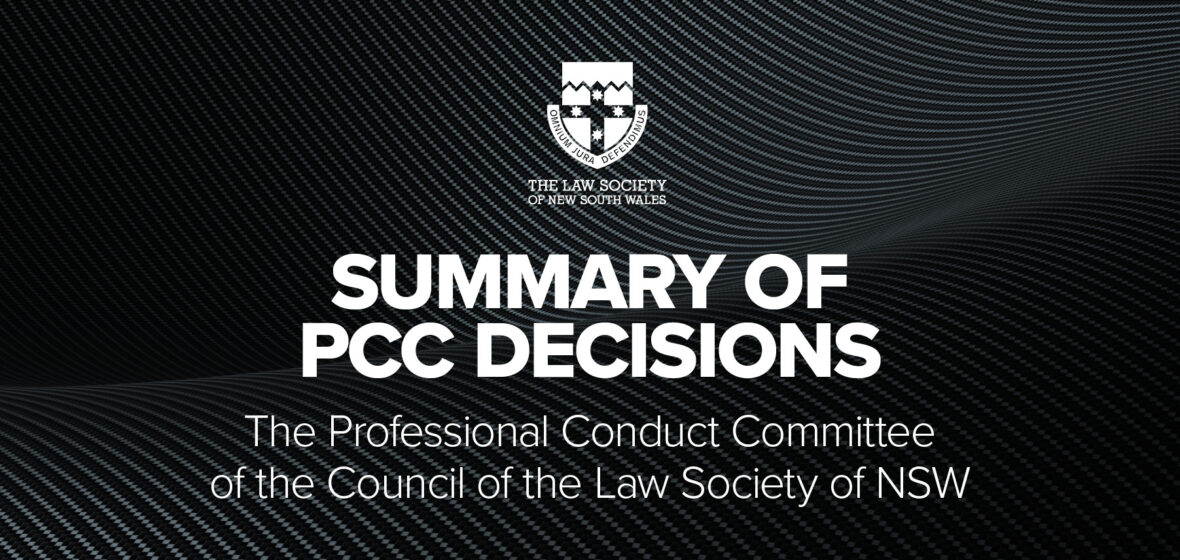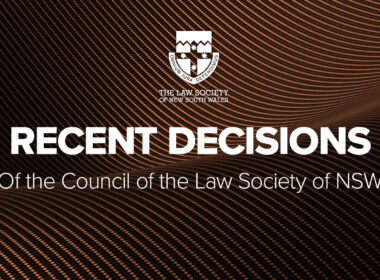Eight matters were finalised this quarter by the Professional Conduct Committee (PCC).
The matters finalised this quarter by the Professional Conduct Committee (PCC) involved the following conduct issues:
- Failing to properly hold/disburse trust money;
- Failing to take action in a timely manner;
- Failing to be courteous in dealings with other practitioners; and
- Engaging in disreputable conduct.
The following are some key principles emerging from the decisions.
Failing to comply with s.138 of the Legal Profession Uniform Law (NSW) 2015
In one matter, proposed consent orders were executed by two parties the subject of legal proceedings. The proposed consent orders awarded one party a settlement amount which was subsequently paid to the payee’s solicitor’s trust account. The solicitor was authorised by the client/payee to pay legal costs from the settlement amount, which led to significant drawdowns by the solicitor. The Court subsequently decided that the settlement was unfair and declined to make the proposed consent orders. The solicitor was asked to return the money paid into trust or to agree that it would be held in escrow for the payer.
S.138(1) outlines how trust money should be held and disbursed:
“…a law practice must—
(a) hold trust money deposited in the law practice’s general trust account exclusively for the person on whose behalf it is received; and
(b) disburse the trust money only in accordance with a direction given by the person.”
Compliance with s.138 turned on the identity of the person, or persons, with the right to deal with the money paid into the solicitor’s trust account.
The PCC considered that the money paid into trust was not the solicitor’s client’s money. The Court had not approved the proposed consent orders and the solicitor was cognisant that the Court required submissions before the proceedings would be finalised. The solicitor was holding the money as stakeholder for both parties pending the Court’s approval of the settlement.
Accordingly, the PCC found that drawing on the settlement amount fell short of the standard of competence and diligence that a member of the public is entitled to expect of a reasonably competent lawyer. The PCC made a finding of unsatisfactory professional conduct and ordered that the solicitor be reprimanded.
Failing to take action in a timely manner
The solicitor acted on behalf of the vendor in the sale of vacant land. The solicitor failed to provide the original signed contract and trust account receipt in a timely manner and also failed to respond to correspondence in a timely manner.
Rule 4.1.3 of the Conduct Rules provides that a solicitor must:
“Deliver legal services competently, diligently and as promptly as reasonably possible.”
In this instance, the PCC made a finding of unsatisfactory professional conduct and ordered that the solicitor be reprimanded.
Although a single instance of delay will not ordinarily justify a finding of misconduct, gross neglect and delay, especially a pattern thereof, can constitute professional misconduct as it brings the profession into disrepute.
Failing to be courteous in dealings with other practitioners
In another matter, the solicitor physically threatened a colleague and used abusive, threatening and discourteous language, whilst inside and outside a court room, towards other practitioners.
Rule 4.1.2 of the Conduct Rules states that a solicitor must “be honest and courteous in all dealings in the course of legal practice.”
The PCC considered, inter alia, the decision of the Administrative Decisions Tribunal in the New South Wales Bar Association v Jobson [2002] NSWADT 171 (Jobson), which considered physical threats and had a similar factual nexus to the matter before the PCC. In Jobson, the Tribunal considered that as the conduct occurred in a public place and in the immediate precincts of a court, in view of not only members of the profession but members of the public, that there must be some public element in the sanction imposed on the practitioner; accordingly, it was appropriate that the practitioner be publicly reprimanded.
The PCC ordered that the solicitor be fined and reprimanded and that discretionary conditions be added to the solicitor’s practising certificate.
Engaging in disreputable conduct
Physical threats and abusive language also enlivens rule 5 of the Conduct Rules (and rule 34, regarding, inter alia, not making statements which intimidate):
“A solicitor must not engage in conduct, in the course of legal practice or otherwise, which—
5.1.1 demonstrates that the solicitor is not a fit and proper person to practise law, or
5.1.2 is likely to a material degree to—
(i) be prejudicial to, or diminish the public confidence in, the administration of justice, or
(ii) bring the profession into disrepute.”
The use of abusive language and physical threats are actions which bring the profession into disrepute and are never acceptable even when committed in the ‘heat of the moment.’
Indeed, the importance of a solicitor maintaining civility and professional courtesy has been reiterated and reinforced by the Courts. The Courts have made clear that a solicitor who engages in rude, discourteous and threatening communications or makes insulting and offensive comments which are “extraneous” to the legitimate pursuit of a legal matter can result in disciplinary consequences, including findings of professional misconduct (see Lander v Council of the Law Society of the Australian Capital Territory [2009] ACTSC 117) or unsatisfactory professional conduct.




